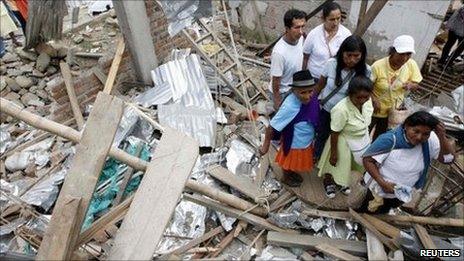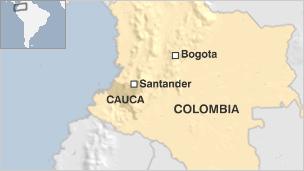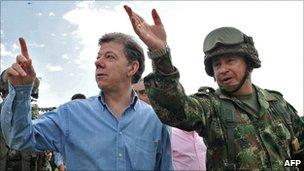Colombia's Farc rebels: Retreating or resurgent?
- Published

Residents of Toribio saw their lives turned upside down in a matter of moments
It was market day in Toribio, a small rural town in south-west Colombia.
By mid-morning, some 3,000 people were busying themselves in the main square, among the stalls packed with fruit, meat and other products.
But then the sound of gunshots, followed by a huge explosion, turned a normal Saturday into a day people would never forget.
Rebels from Colombia's biggest guerrilla group, the Revolutionary Armed Forces of Colombia (Farc), had detonated a bus laden with gas canisters. The blast killed four people and injured 103.
Almost 500 houses were badly damaged - practically the entire town.
Toribio, located in the mountains of Cauca province, some 304km (189 miles) from Bogota, had seen plenty of Farc attacks before.
"But this is the worst that ever happened to us," Mayor Carlos Banguero told the BBC.
That same day, 9 July, the rebels also targeted three other neighbouring towns.
"The attacks... brought back images that Colombians thought were in the past," an article in Colombian newspaper El Tiempo said.
The Farc has been hit hard in recent years by Colombian government forces.
But the latest attacks have raised questions as to whether the rebels are back on the offensive.
No hiding places
The issue is being debated almost daily by politicians and the media, with some arguing that the security policies of President Juan Manuel Santos have emboldened the rebels.
Mr Santos categorically rejects this.
Speaking just after the Cauca attacks, he insisted that the rebels were acting "out of desperation".

"They're doing their best to distract the security forces because we're taking away their sanctuaries and lairs," he said.
A report published on 17 July by the Bogota-based think-tank Corporacion Nuevo Arco Iris said that the increasing number of Farc attacks was not the result of a supposed weakness of Mr Santos's military strategy.
The rise, the group said, stemmed rather from a strategy the rebels started to implement in 2008.
"The Farc came to realise that they needed to wage a different kind of war," said Leon Valencia, the director of Nuevo Arco Iris.
"And Cauca is their laboratory," he told the BBC.
According to Nuevo Arco Iris, the rebels are using much smaller units and increasingly relying on car bombs, ambushes and hit-and-run attacks.
"It's a strategy that allows them to exist, to say: 'Here we are, you can't forget about us,'" Mr Valencia said.
"I believe they will try to regain some strength to force a negotiation," he explained.
Drug routes
Juan Obdulio Gaviria, an adviser to former President Alvaro Uribe, believes the surge in Farc activities is linked to the possibility of talks.
"It is the result of having dropped the policy of permanent confrontation for one which contemplates the possibility of dialogue," he said.
Mr Gaviria also said the armed forces had been undermined by the prosecution of several of its members for alleged human rights violations.

President Santos insists the rebels are on the back foot
"Any military operation is now examined as if it was a crime, and that has lowered the troops' morale," he said.
Illegal drug production and trafficking are also factors.
The Farc rely heavily on the cocaine trade to finance their campaign.
"What we're seeing is a battle to get back some of the drug-trafficking routes towards the Pacific Ocean," said Juan Carlos Villegas, the president of the National Business Association of Colombia (Andi).
This is consistent with the increasing number of attacks in Cauca, Norte de Santander, Arauca, Caqueta and parts of Antioquia reported by Nuevo Arco Iris.
In these regions, the number of Farc attacks during the first six months of 2011 exceeded last year's total.
In Colombia overall, the 1,115 Farc attacks registered from January to June represent an increase of 10% when compared with the total for the same period last year.
Mr Valencia says there were also increased attacks in the two previous years, when President Uribe was still in power.
The Nuevo Arco Iris report says that the hardline security policy pursued by Mr Uribe did deliver significant blows to the rebels but successes were over-exaggerated.
The continued guerrilla presence, the report concludes, suggests that "these successes will tend to fade".
So far, the Farc upsurge seems to have had little impact on the lives of most Colombians, especially those living in urban areas.
Officials are keen to stress that security will be tight during the forthcoming Fifa U-20 World Cup from 29 July - 20 August. , external
And the country's tourism authorities will be hoping their marketing message resonates with people thinking of visiting Colombia: "The only risk is you might want to stay."
- Published18 July 2011
- Published18 June 2011
- Published29 August 2013
- Published4 July 2011
- Published30 June 2011